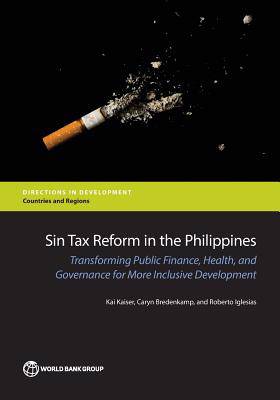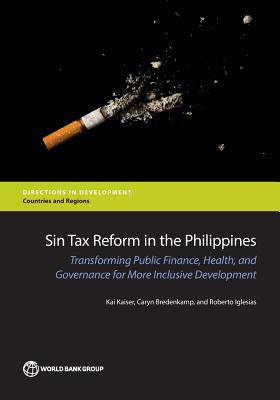
- Retrait gratuit dans votre magasin Club
- 7.000.000 titres dans notre catalogue
- Payer en toute sécurité
- Toujours un magasin près de chez vous
- Retrait gratuit dans votre magasin Club
- 7.000.0000 titres dans notre catalogue
- Payer en toute sécurité
- Toujours un magasin près de chez vous
Sin Tax Reform in the Philippines
Transforming Public Finance, Health, and Governance for More Inclusive Development
Kai Kaiser, Caryn Bredenkamp, Roberto Iglesias
56,45 €
+ 112 points
Description
Excise taxes on tobacco and alcohol products can be an effective instrument for promoting public health through the curbing of smoking and excessive drinking, while raising significant financing for development priorities. Designed and implement well, excise taxes represent a win-win for public health and finances. While the public policy rationale for excise reforms is strong in both developed and developing countries, realizing reforms in practice often faces significant opposition by the industry and vested interests. Low level, complex and poorly designed excise tax regimes persist. Getting the technical details right, and effectively managing the political economy of reforms, are vital to securing better excise tax outcomes. The Philippines passed in 2012, implemented, and has been results monitoring a successful tobacco and alcohol tax, dubbed Sin Tax. The reform not only greatly increased, simplified and improved the excise tax reform, but also earmarked the significant part of the large ensuring incremental revenues to helping finance Universal Health Care (UHC) for the bottom forty percent of the population. Sin Tax Reform in the Philippines summarizes both the technical and political economy aspects of tobacco and excise tax reforms. The study analyzes issues of rate structure and levels, implementation phasing, and equity impact analysis. The book is intended as a resource for audiences in both the Philippines and other countries wishing to promote successful excise tax reforms to towards between public sector governance, finances and health. For the Philippines, it highlights measures to ensure that the revenue and expenditure measures associated with the reform continue to be delivered, and can be deepened over time. The Philippines experience should prove encouraging and useful for reform champions in other countries advancing similar types of excise tax and development financing/expenditure earmarking for equitable development and public health.
Spécifications
Parties prenantes
- Auteur(s) :
- Editeur:
Contenu
- Nombre de pages :
- 146
- Langue:
- Anglais
- Collection :
Caractéristiques
- EAN:
- 9781464808067
- Date de parution :
- 13-07-16
- Format:
- Livre broché
- Format numérique:
- Trade paperback (VS)
- Dimensions :
- 178 mm x 254 mm
- Poids :
- 267 g

Les avis
Nous publions uniquement les avis qui respectent les conditions requises. Consultez nos conditions pour les avis.






